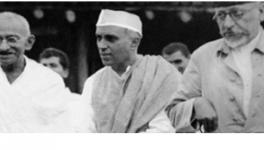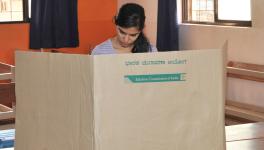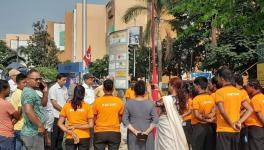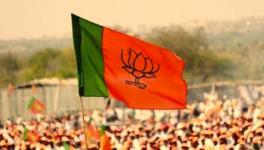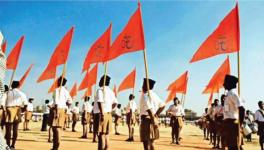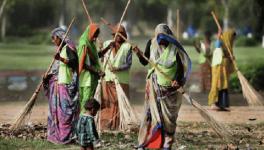6th Phase of Polling Marked by Missing Voters, Discrimination, Say Independent Observers
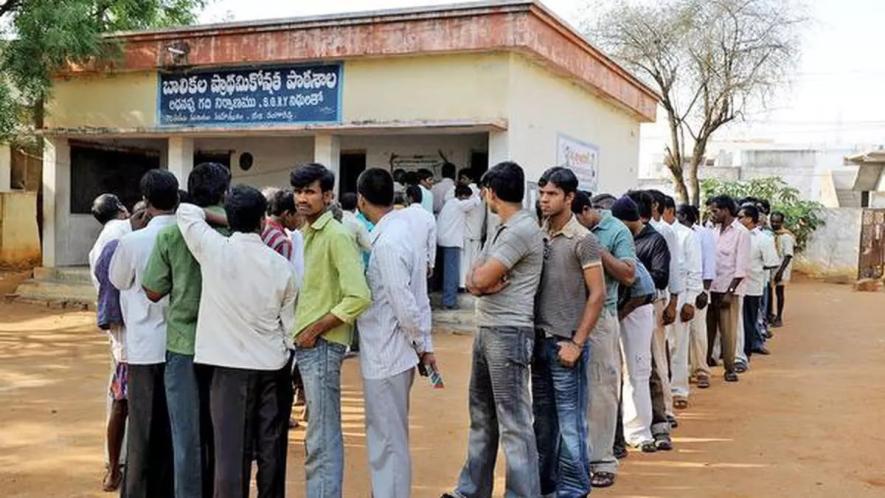
Representational Image. (Credit: Frontline)
The Election Commission of India (ECI) was considered to be one of the powerful and respected constitutional bodies in the country. Never before has its independence and neutrality come under such severe doubts in the last seventy-five years as it has in the last few years under the current regime.
As one of the most crucial elections is almost coming to a close, the role of the commission and its complete silence on violations by the ruling party has been an unfortunate hallmark through the election process. The institution seems to have lost sight of its constitutional mandate so much so, that its own commissioners have resigned. The commission’s silence and refusal to make public the absolute number of votes in constituencies, definitely validates the fears that the referee was swiftly becoming a star striker for one side!
But, the citizens of the country have been vigilant and have not let this slide, from demanding accountability, moving the Supreme Court, writing letters to the ECI to take note. The Independent Election watch is another step by the citizens of the country to step up, where institutions seemed to have dropped the ball.
The reason why the Independent Election Observers teams were set up by the Citizens Watch Group, were precisely with this assessment of the emergent situation and to make sure that elections were monitored by the very people, who are the ultimate decision-makers in a constitutional democracy! The active participation of hundreds of ordinary volunteer members in the IEO process stood testimony to the fact that while people were fighting against the suppression of their will by the institutional manipulations on the one hand, citizens also had the responsibility to be a watchdog over our own systems meant to protect democracy.
As far as this objective was concerned, the election observation process in Delhi by the IEO teams were not only a huge landmark and success, it witnessed true empowerment of citizens vis-a-vis state powers!
With this objective in mind, this press release is a brief of the work done by IEO in ensuring free and fair elections in Delhi. We received several distress calls through the helplines that were set up, largely from the North East Delhi constituency, as well as from East and West Delhi.
We filed hundreds of online complaints to the c-Vigil app and also amplified the complaints to the helpline numbers provided by the ECI. However, the most definitive aspect of our work was the physical monitoring of the election process, done by close to 380 volunteers associated with the IEO across the seven constituencies of Delhi and in the adjacent Faridabad and Gurgaon areas of NCR.
We had stationed teams in sensitive areas and close to 20 teams that moved around across polling stations in every constituency with an identification that was issued by the IEO process.
The teams observed various kinds of discrepancies in the process and the violation of MCC and criminal apathy of the ECI.
Key Findings:
Systemic exclusion of the working class and minority sections
This trend is disturbing in order to suppress and sabotage their electoral choices was the most obvious finding across different areas of Delhi.
Missing voters and deletion of voters were among the most actively heard complaints by IEO teams in the field.
Many people’s names were deleted from the electoral roll and were not allowed to vote despite having their names in the deleted list and possessing valid election identity documents. Unfortunately, this is not a uniform trend and instead the majority of voters impacted from this were from the Muslim community, which points towards an orchestrated institutional exclusion.
It was also not a surprise that among the non-Muslim areas that complained of large number of voter deletion was the polling booth allotted for JNU at the Kendriya Vidyalaya in Munirka, South Delhi.
- A) It was also noticed that the ECI *orchestrated mis-governance to dissuade certain sections of voters.
The most visible aspect of this is the disproportionate number of voters in booths in the working class and Muslim localities, which makes it practically impossible to cast votes within the limited time of 11 hours between 7am to 6pm.
In contrast, booths in posh localities or Hindu middle-class areas had fewer numbers of voters. The data for this is easy to access but not talked about by parties or media.
On an average, the middle-class areas of the city have 1100 voters while in Muslim areas you see the numbers jumping up by over 450 votes, to 1550 votes per polling booth. Similarly in AAP/Congress favouring working class areas, the average voters per booth stands around 1500 per booth.
In some Muslim areas like Jaitpur-II, Jamia Nagar and Shaheen Bagh, the numbers stood at an alarming 1650-1700 voters per booth! The key question is about the calculation made by ECI in making such cramped allocation to such booths, while the average time taken per votes cast is 50 seconds to one minute.
So, it is evident that even under the most efficient management systems, no more than 750-800 votes can be cast in one polling booth, displaying an architectural negligence or worse, criminal conspiracy that has been executed to make sure that voters wouldn’t be able to cast their constitutional right.
- B) Slow voting was one of the most persistent issues in the booths in the working class- specially in Muslim and Dalit localities. Despite a number of complaints filed in the ECI, the slow voting continued. Inside some booths, polling officials were noticed talking on the phone, talking to each other and slowing the process down – in what appeared like deliberate acts. A)
Institutional negligence and apathy
In many booths voting stopped at 6 pm, despite voters reaching the booth in time. In areas like Khajuri Khas and Okhla, complaints were received that police barricaded the booth in such a way that voters were not allowed to reach the polling station gate after 5 pm itself.
- B) While some polling stations had made good arrangements to tackle the heat, creche for helping mothers, medical assistance etc, many polling stations had poor arrangements by the election commission, especially in working class localities. They were made to stand in a queue outside the booth. There were very poor arrangements of water and cooler fans while the Delhi temperature rose to its highest in years. Many voters had to leave the queue after waiting for over an hour in the crippling heat wave.
- C) Many people complained about the voter slips not being distributed on time by the BLOs. Even inside polling stations, BLOs in Muslim areas and JJ colony areas were found missing in action. This made the voters stand in queue for hours first to find their names in the electoral roll and then to vote, creating a lot of chaos and immense delay inside the booth. Voters had to wait for much longer than required. Additionally, instances of people being unaware of the exact process of voting meant that in some areas, the voting was delayed simply due to an ignorant mistake of pressing the party symbol instead of the blue button!
This could have been easily corrected with information and intervention. Instead, there were reported instances of voters (especially the elderly) sharing that they were unable to see the symbols clearly, upon which the polling booth agent directed them to press the second button (the BJP’s symbol), without any clear explanation!
While this was addressed then and there, this behaviour is symptomatic of a much deliberate, deeper rot in the intent of fairness of some of the officials.
- D) Additionally, the shifting of polling booths away from residential areas in working class areas caused hardships to women and elderly. Many voters complained about their booth being far from their locality and hence expressed inability to vote.
A) Faking ignorance of illegality and violations by one side
-To the violations and the complaints filed by our teams, the ECI largely maintained a hypocritically ingenuous ignorance. The ECI did respond to our calls but did not show the courage and intent to resolve the violations. Its response was largely passive and it marked our complaints resolved without actually resolving the issue.
The fact that many parts of Delhi had banners and placards that openly boasted about how Modi government will be brought back for having installed Ram Lala at Ayodhya made open mockery of MCC, right under the nose of the ECI.
Additionally, even complaints by candidates that BJP workers were openly carrying out campaigns inside the booths, fell on deaf ears.
- B) Violation of MCC by the BJP workers around the booth was noticed in many localities. BJP workers were seen raising their party flag and shouting slogans. In many places, our volunteers, in their capacity as citizens and IEO members, openly objected to visual campaigns by BJP cadres. While in most places we could succeed, but in some places, our volunteers were threatened with dire consequences! Threat of state violence serving as a reminder-
The excessive mobilization of police, paramilitary and home guard forces in Muslim dominated areas was evident all through the city. While this was being done under the garb of ‘guarding sensitive booths’, in reality it served as a crude reminder to the 2020 violence in North East Delhi and during lockdown, when Muslim community was at the receiving end of communal hatred and prejudice!
However, the interventions by community elders, mature police officers and civil society groups helped in calming the tempers down rather than turning into violent clashes.
Gender and class concerns – Women were expected to be in larger numbers participating in these elections for multiple reasons. All campaign groups and journalists reported this prior to the elections in the national capital. However, the comparison between such expectations and the end polling percentages shows different results. Women, especially Muslim women’s participation was much lower than expected for a mix of the factors presented above. Even in working class areas of the city, including rehabilitation camps, the participation of women was much lower than expected.
The deficiency in organizing basic circumstances that could have empowered and encouraged women voters stand out in contrast to the ECI’s claim that they were encouraging voters to come out in large numbers. This is especially visible in the instances (especially in Muslim majority constituencies) where voters were not allowed to bring their children inside the polling booths.
This led to last-minute anxiety and delay in voting, as couples struggled to find someone to whom they could hand over their young children to, as they tried to go in and vote.
Get the latest reports & analysis with people's perspective on Protests, movements & deep analytical videos, discussions of the current affairs in your Telegram app. Subscribe to NewsClick's Telegram channel & get Real-Time updates on stories, as they get published on our website.











